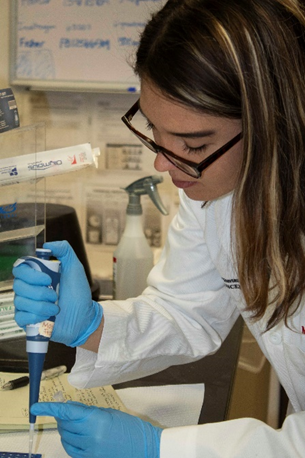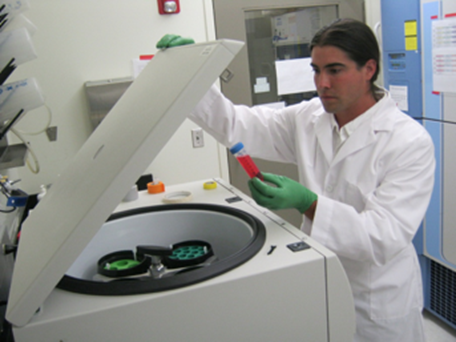Finding a career path in
biomedical research can be challenging for many young people, especially when
they have no footsteps to follow. We asked three recent college graduates who
are pursuing advanced degrees in biomedical sciences to give us their best
advice for undergrads.
Tip 1: Talk with mentors and peers, and explore opportunities.
One of the most challenging things for incoming undergraduates is simply to find out about biomedical research opportunities. By talking to professors and peers, students can find ways to explore and develop their interests in biomedical research.

Credit: Michele Vaughan.
Mariajose Franco, a first-generation college student, recently graduated with honors and dual degrees in molecular and cellular biology and physiology from the University of Arizona in Tucson. She’s now in a postbaccalaureate program at the National Cancer Institute and has her eye on combined M.D.-Ph.D. programs.
As an undergraduate, a course in cancer biology piqued her interest, and she reached out to her professor, Justina McEvoy, to see if she could join her lab. As a sophomore, Franco began working on rhabdomyosarcoma, a rare childhood cancer that arises from cells that normally develop into skeletal muscle. Through the NIGMS Maximizing Access to Research Careers (MARC) program, she received support to conduct two research projects during her junior and senior years. In addition to offering research opportunities, the MARC program was instrumental in providing training in scientific writing and conference poster presentations, and navigating applications, Franco says.
Continue reading “Back to School: Top Tips for Undergraduates Eyeing Careers in Biomedical Sciences”
 Cover of Pathways student magazine.
Cover of Pathways student magazine.


 Joshua Marceau at Salish Kootenai College, where he gained research experience as an undergraduate. Credit: Joshua Marceau.
Joshua Marceau at Salish Kootenai College, where he gained research experience as an undergraduate. Credit: Joshua Marceau. Credit: Michele Vaughan.
Credit: Michele Vaughan. Credit: University of Nebraska, Lincoln.
Credit: University of Nebraska, Lincoln. Viravuth (“Voot”) Yin, associate professor of regenerative biology and medicine at MDI Biological Laboratory and chief scientific officer at Novo Biosciences, Inc., in Bar Harbor, Maine. Credit: MDI Biological Laboratory.
Viravuth (“Voot”) Yin, associate professor of regenerative biology and medicine at MDI Biological Laboratory and chief scientific officer at Novo Biosciences, Inc., in Bar Harbor, Maine. Credit: MDI Biological Laboratory.
 Dr. Melissa Wilson.
Dr. Melissa Wilson.
 Cover of Pathways student magazine.
Cover of Pathways student magazine.